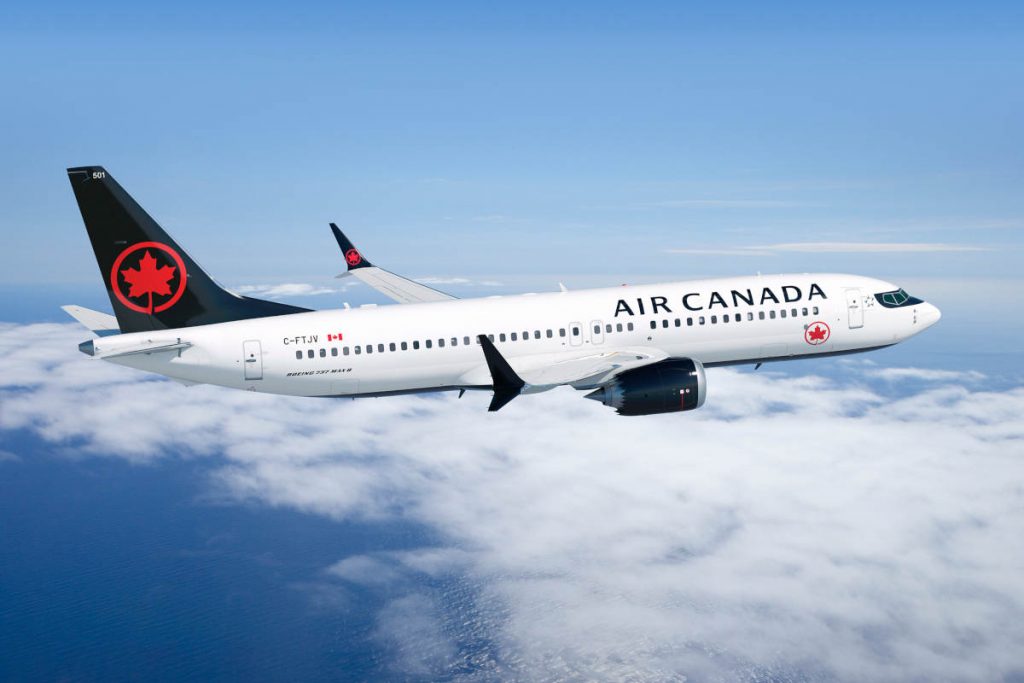
News
Airlines
Air Canada reports Q2, removes 737 MAX from schedule until 2020
“The impact of the Boeing 737 MAX grounding will be felt more acutely in our very busy summer period.”
August 1, 2019 By Wings Staff
 Air Canada Boeing 737 MAX. (Photo: Air Canada)
Air Canada Boeing 737 MAX. (Photo: Air Canada) Air Canada on July 30 reported second quarter results, ended June 30, with a net income gain of $343 million compared to a second quarter 2018 net loss of $102 million. The most-recent quarterly numbers beat the airline’s expectations despite the negative impact from the Boeing 737 MAX grounding.
Air Canada had 24 737 MAX aircraft in its fleet at the time of the grounding in March 2019 and was scheduled to receive another 12 such aircraft by the end of July 2019. These deliveries are now expected to take place in 2020. In releasing its Q2 2019 results, Air Canada stated it will remove the MAX from its schedule until at least January 8, 2020.
“This reflects our prudent approach to scheduling, giving customers certainty when booking their Fall and especially their Winter holiday travel,” said Calin Rovinescu, president and CEO of Air Canada. Earlier this week, Southwest Airlines announced it would remove the MAX from its schedule until at least January 5, 2020.
“I am delighted to report an excellent second quarter, including record operating revenues of $4.757 billion and record liquidity of nearly $7 billion,” said Rovinescu. “Although our results exceeded expectations, the Boeing 737 MAX grounding negatively impacted EBITDA growth year-over-year. Our management team and all employees involved with this complex issue did an incredible job implementing creative solutions for our fleet, schedule, network and operations to get passengers to their destinations during the quarter.”
Air Canada generated an EBITDA of $916 million in the second quarter of 2019, compared to second quarter 2018 EBITDA of $739 million. The airline reported second quarter 2019 operating income of $422 million compared to second quarter 2018 operating income of $308 million.
Rovinescu continued to explain that the airline’s second quarter results were boosted by system passenger revenues, up 10.7 per cent (reaching $4.3 billion), on capacity growth of 2.3 per cent. These numbers were also driven by a yield improvement of 6.8 per cent and traffic growth of 3.6 per cent. The yield improvement, according to Air Canada, reflected incremental higher-yielding local traffic due to the impact of constrained capacity caused by the grounding of the 737 MAX aircraft and a generally improved pricing environment.
“The impact of the Boeing 737 MAX grounding will be felt more acutely in our very busy summer period and, as a result, third quarter EBITDA is expected to increase approximately five per cent versus the third quarter of 2018,” said Rovinescu. “Third quarter projected capacity is expected to decline approximately two per cent compared to the third quarter of 2018, as opposed to an originally planned capacity increase of approximately three per cent.”
Air Canada also reported demand for air cargo has decreased industry-wide, particularly in the Atlantic and Pacific markets, pointing to on-going trade disputes. The airline reported Cargo revenues of $177 million in the second quarter of 2019 and $354 million in the first six months of 2019, decreases of $23 million (12.1 per cent) and $14 million (4.1 per cent), respectively, from the same periods in 2018. Cargo traffic decreased by 7.0 per cent in the second quarter of 2019 and by 2.4 per cent for the first six months of 2019, relative to the corresponding period of 2018.